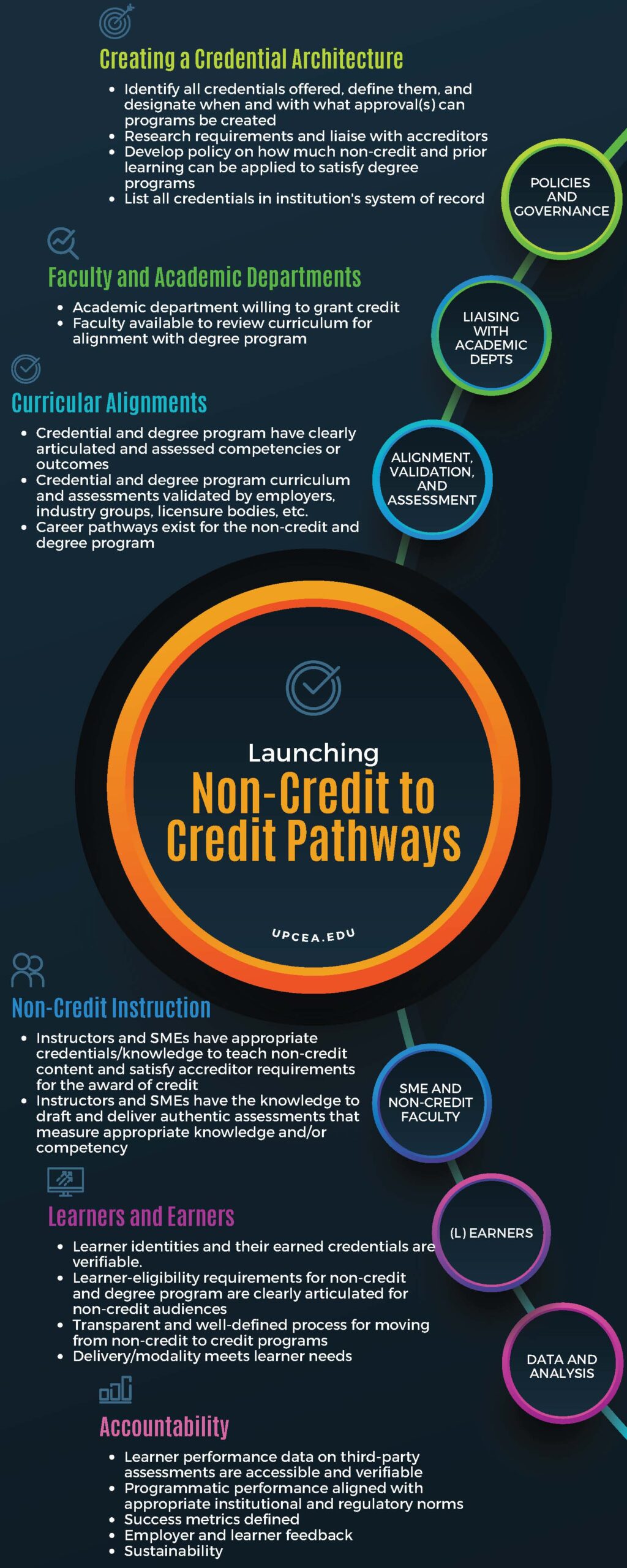Creating Noncredit to Credit Pathways
Alternative credential experts identify the conditions necessary to design and deliver noncredit to credit pathways at postsecondary institutions.
Over the course of 2022, the Typology, Terminology, and Standards Subcommittee[1] of the Council for Credential Innovation discussed the conditions necessary to create noncredit to credit pathways at postsecondary institutions. Their deliberations eventually narrowed to noncredit learning designed and delivered by two- and four-year institutions and applied to degree programs at the same institution. Professionals in postsecondary education know how vast the chasm is between noncredit and credit programs, even within the same institution.
“Noncredit operations exist in different administrative systems, tend to measure learning in competencies and skills rather than credit hours, and while institutional faculty tend to be utilized in noncredit instruction, institutional leaders are still struggling to apply this learning in their own degree programs,” stated Julie Uranis, Senior Vice President for Online and Strategic Initiatives at UPCEA. “Learners are not interested in the divisions that exist on our campuses. They want to have their college-level learning, in relevant subject matter, applied to degree programs to satisfy some degree requirements.”
The product of the Subcommittee’s discussions is an infographic, highlighting the conditions necessary to create noncredit to credit pathways. “There are many issues to consider when we talk about noncredit to credit pathways,” shared Jenni Murphy, Dean of the California State University, Sacramento’s College of Continuing Education. “We decided an infographic could be a valuable tool to help senior leaders and faculty understand the issues associated with this work. We hope this infographic will be utilized by professional and continuing practitioners as they work to create new opportunities for learners and seek buy-in on their campuses.”

Click here to download the infographic.
Developing and offering alternative and non-degree credentials (certificates, micro-credentials, digital badges and non-credit programs) has become a new priority in professional, continuing and online education. UPCEA is leading the way with focused initiatives centered around new credential innovation with research, peer-led sessions and resources for leaders charged with entrepreneurial initiatives, stakeholder engagement, faculty and learner experiences, digital technology and more. Learn more about the Council for Credential Innovation and UPCEA’s Alternative Credentials Network here.
Higher education leaders in innovative credentials will be gathering November 1-3, 2023 in Washington, DC for Convergence: Credential Innovation in Higher Education. Presented jointly by UPCEA and AACRAO, two of the organizations most critical to the future development and implementation of innovative credentials, this event brings together key campus stakeholders in credential innovation—deans of professional education, chief online learning officers, registrars, and their staff—to define and develop their institutional strategy with respect to alternative credentials. Learn more and register.
[1] Julie Uranis, UPCEA; Sarah DeMark, Western Governors University; Mark Leuba, 1EdTech; Jenni Murphy, California State University, Sacramento; Roy Swift, Workcred; Arthur Thomas, Syracuse University; Michael Torrence, Motlow State Community College; Melissa Mahan, University of Texas at San Antonio; Cheryl Murphy, University of Arkansas; Sharon Paynter, East Carolina University; Tatum Thomas, DePaul University; Christina Trombley, Drake University; Ellie Udeh, University of Southern Maine; Tyler Ritter, UNC Chapel Hill
Other UPCEA Updates + Blogs
UPCEA Announces 2026 Association Award Recipients
9 Individuals and 6 Programs Receive Association’s Highest Honors WASHINGTON, February 9, 2026 – UPCEA, the online and professional education…
UPCEA Congratulates Members Recognized in the 2026 U.S. News & World Report Ranking of Best Online Bachelor’s Programs
Nineteen of the twenty-three Top 20 Ranked Institutions are UPCEA Members WASHINGTON, D.C. (February 5, 2026) — UPCEA, the online…


